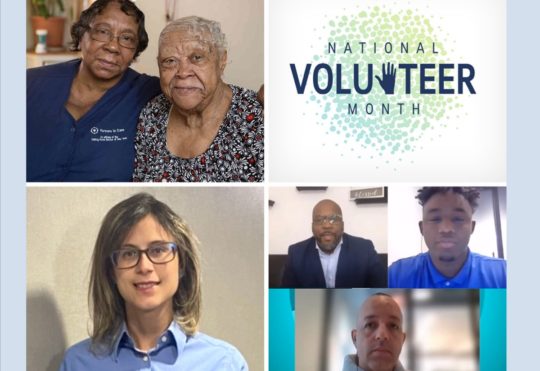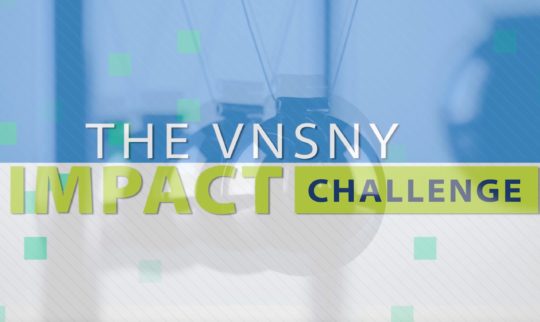Hitting Home: A Ukrainian Colleague Shares Her Story
New York City is home to the largest Ukrainian American population in the U.S. Over 150,000 Ukrainians live within the city’s five boroughs, many of them residing in the Ukrainian communities of Manhattan’s Lower East Side and Brighton Beach, Brooklyn. The war in Ukraine has had a particularly devastating impact on these New Yorkers, including our Ukrainian American colleagues, patients, clients, plan members, and their families who are part of our VNSNY community. Our hearts, thoughts, and support go out to all of them at this extremely difficult time.

Please meet Kateryna Vinarskiya, a Ukrainian-born home health aide who’s been with Partners in Care for a little more than two years. We thank her for taking the time to speak with us about how the situation has affected her and her family members back home. We spoke with Kateryna a little over a week into the war.
I came to the USA four and a half years ago to pursue my dream of becoming a registered nurse. I grew up in Fastiv, a nice, clean little city that’s very close to the Ukrainian capital of Kyiv, and I work as a home health aide for Partners in Care, taking care of elderly clients. I’m currently completing my prerequisites at Borough of Manhattan Community College and will eventually go on to nursing school, hopefully.
It’s been eight days since this war began, and it changed my life instantly and completely. I’m the only one of my family members who is in this country. I’ve been unable to eat or sleep, and have been constantly thinking about my family and about ways to help them escape. It feels like a bad dream. Thank God they were able to move to a village a little farther away from Kyiv, which is now surrounded, but even though that was a bit safer, they had to leave their house and most of their belongings behind. They could only take the most important things—money, jewelry—in one little suitcase. They knew they might never come back, or—if they did—there might not be a house there anymore. Or it might no longer be theirs.
I feel lucky that I am still able to speak to my family over the phone—I know that some people in Ukraine don’t even have the ability to call anymore. There’s a seven-hour time difference, so I stay up until midnight to call them at 7:00 a.m. their time, when they’re waking up. I need to talk to them, to hear how their night was, and whether there were any bombs. Of course, it’s also a way of making sure that they’re still alive. My uncle—my mom’s brother—is a soldier on the front lines. He carries a cell phone and I check on him regularly, too. It’s a relief to speak with him, but it’s war. Anything can happen at any second.
People are getting killed and it seems like nothing can stop it. I can’t believe that this is happening in the 21st century. A few days ago, my mother and my sister managed to escape to Poland, which was a very long and difficult trip. They were sleeping in train stations, and they were hungry and thirsty—many stores have run out of supplies. Thankfully, as they got closer to the Polish border, they were helped by volunteers who gave them food and water. But it’s a very sad situation. I believe that my sister has PTSD—she cries nonstop. We’re also very worried about my little brother, who is not allowed to leave the country. He just turned 18, and had just started college to study IT, computers and technology. He’s a very smart boy. He’s staying with relatives right now.
I’m doing everything I can to help my family. I sent them all of my savings right away—whatever I was able to save up as a student—and told them to get money out of the bank immediately because we don’t know whether or how long the banks will still be working. I was also able to find a program to offer some free psychological help for my sister.
I’m getting comfort from my friends. I have gotten a lot of emotional support from my friends here—even my Russian friends. Because they’re here, they can assess the situation from all angles and are not being brainwashed by the propaganda on Russian TV. They call and visit and check in on me and ask me how my family is doing. I’ve also gotten support from Ukrainian social media. Even though there’s a war going on, we sometimes lighten the mood by making little jokes with each other. A little humor really helps, even in dark times—or especially in dark times. It’s a very difficult time, but I’m doing my best. I work with elderly people who need my help, and that is very rewarding for me as well. I’m proud of the work that I do.
I’m very happy that Ukrainian people have access to social media and are able to see that the world sees them and supports them. I believe that everybody should be there for each other and support each other. And I encourage anybody who can to donate to the relief effort. Even if it’s just two dollars or five dollars. That might not sound like much, but it can be enough to get food and water to someone who is in desperate need.
For tips on how to cope with stress, anxiety, and fear due to the war in Ukraine, please click here.

